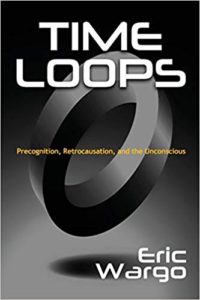Childhood’s End … and the End of Camping, Too
To me, the most haunting image in Richard Dolan and Bryce Zabel’s new book A.D. After Disclosure is this paragraph (p. 86):
There is … a story offered by a high-level intelligence official about a UFO briefing President Carter received in June 1977. It was unknown to the source what specifics were discussed, only that when the President was seen in his office, he was sobbing, with his head in his hands, nearly on his desk. It was clear that the President was deeply upset.
The authors of A.D. offer a very persuasive prediction for how humans will react to the knowledge of “Others” visiting or living on our planet. But while they comprehensively summarize the various other possibilities, they appear, along with almost everyone who has ever given an interpretation of the data, to basically favor the extraterrestrial hypothesis — that those Others come from space (or if not space, then somewhere else similarly exotic — other dimensions, the future, etc.). But my question in this post is this: Would revelation of extraterrestrials on earth be enough to bring a president to tears?
I think the reaction to a disclosure that, instead, the Others were actually from right here on earth — that is, that they were cryptoterrestrial (to use Mac Tonnies’ term) rather than extraterrestrial — would be far, far more unsettling to us individually and as a society than the authors consider. It would make sense of Carter’s reaction. It would also put the decades of government secrecy and disinformation in a whole new light. To my mind, it could almost justify it. (And bear with me.)
Our natural anxiety at the prospect of visitation by extraterrestrials (anxiety over their advanced technology, their uncertain motives, our newfound insignificance in the cosmos, etc.) would in an A.D. situation be tempered, as Dolan and Zabel note, by a great deal of awe. There would be so much to learn, so many ways in which our minds and our lives would be forced to grow and change, so much redefinition of our place in the universe. Awe may even ultimately triumph over anxiety. This would certainly be the case if, as many predict, Disclosure came with a reassurance that such beings are here to observe us, perhaps even help us, and basically mean no harm. For this reason, whatever the conflicted feelings they’d arouse in us, beings from other planets would probably not seem like monsters. Who wouldn’t want to meet one, touch one, talk to one? I know that it would be the greatest moment in my life to stand in front of an extraterrestrial being face to face.
Even if they turned out to be hostile, requiring a mobilization of our defenses, martial law, etc., we would react to them like foes — opponents — not as horrors. We describe Nazis as “monsters,” but they were fathomable, we met them on safely remote battlefields, they were technological and malevolent mainly in a political and human rights sense. Americans at home or in other places than Europe didn’t fear encountering them on lonely roads or when out camping; we didn’t have nightmares about them coming into our homes and kidnapping us. They were not horrifying archetypes of the collective unconscious.
But think how it would be different if it were to be revealed that the “aliens” had always been here, were from right here on earth, and shared a common ancestor with us. The reaction would be totally different, I think. Would there be any awe to counterbalance our anxieties?
As intellectually fascinating as the prospect of cryptoterrestrials is, I think standing face to face with a coldly emotionless, pale, and highly intelligent secretive dweller of our planet would scare me shitless and not make me feel anything in the way of awe. To the contrary: Every primal human terror, every nightmare, every notion of the monsters under our beds or visiting our homes at night, would be confirmed as real, not just as figments of our imaginations. (In a previous post I discuss how intrinsically repulsive or frightening cryptohominids would be, simply on the basis of their close-but-not-quite-human physical form.)
Think about it for a second. If there is a race of stealthy “people” who for millennia have visited and even abducted people — who are perhaps responsible not only for animal mutilations but for disturbingly similar human mutilation cases and even the 30,000 unexplained disappearances of humans every year, it would give new reality to the most horrifying of archetypes. How similar is the Nosferatu archetype for instance — pale, gaunt, bald, long fingers, as he appears in the window gazing in on us with animal desire — to a stereotypical “gray”? And what is the animal mutilation typically associated with UFOs but seemingly vampiric behavior? No one would ever go camping again.
Compounding the horror, revelation that the Others were cryptoterrestrial would make the world bleaker — depressingly so. For one thing, it would destroy the ET myth, which probably hovers in the back of our minds as a reassuring possibility more than most people would care to admit. What are extraterrestrials, at least in our pre-Contact archetypal pantheon, but a kind of hope for a world and a life that’s bigger? Some even see them as angels. Revelation of a cryptoterrestrial origin for UFOs would rob us of that Great Hope and make us feel very, very alone indeed — alone as Ripley at the end of the movie Alien. Alone in the sea of space, sharing our cramped planet with a smarter, colder distant relative that is not only mildly, thus more disturbingly, other, but also historically somewhat malevolent. In space, no one can hear you scream.
So I can’t help but feel that the cryptoterrestrial possibility would result in a very different post-disclosure world than the socially and intellectually engaged, technologically and maybe militarily mobilized world Dolan and Zabel envision. There would be zero desire for “contact,” except perhaps by a narrow subsection of scientists. Many or most global villagers would take to the streets and to the air and to the caves and to the water and to the Internet, pitchforks raised. There would be not only “social unrest” but probably an ultimately uncontainable worldwide frenzy to “destroy all monsters.” (Moreover, any slighter physical resemblance to particular human races — e.g., Asians? — would perhaps rekindle the kinds of racism it has taken a century, and the global village, to begin to erode. Humans would turn against humans, not just against the real Others.) If you think the “war on terror” is distressingly open-ended, imagine a “war on horror.”
Just in this century we possess weapons that could really pose a threat to a hidden species. Underground bases may seem safe, but we now have bunker-busting missiles — even nuclear tunneling machines. Some angry country — even ours, if compelled to by a terrified voting public — could certainly do a lot of harm to a secretive subterranean or underwater civilization with just a few well-placed nukes or deadly biological agents. So what we say of bears would probably be just as true of cryptoterrestrials: They are as scared of us as we are of them. Shitless, would be my guess.
Tonnies made a good case that this possibility — that the Others are a vulnerable, scared, earthbound species — makes the best, indeed most parsimonious (albeit counterintuitive) sense of the theatricality of UFOs and their pilots. All the bright lights — what is that but an attention-getter? They want us to see them but also be awed by their technology, so they dazzle us, orchestrate displays of their apparent military superiority. By their unpredictable, bizarre behavior they reinforce the idea of their literal otherworldiness. In abductions, as in the famous Betty and Barney hill case, they unveil almost comical star maps and point to them. The alien seductress who essentially “raped” Antonio Villas Boas afterwards pointed to her belly and then to the sky.
The entire UFO phenomenon could really be a big PR disinformation effort to preserve their safety. As much as we hate and fight the monumental disinformation about UFOs our government has engaged in for the last 60 years, the prospect of the genocide of a vulnerable terrestrial race would make that policy seem, in hindsight, not only sensible but necessary. I wouldn’t blame the secret-keepers so much if it were the case. And as Disclosure comes to seem more and more inevitable, such a reality would sort of justify the imperative to foster the extraterrestrial hypothesis at all costs — to the extent of not allowing any scientific investigation of the beings that could reveal a common genetic code. Such a policy of deception will have been, in this scenario, as much for the Others’ protection as for ours.
There are lots of stories about underground alien bases — in the Pacific Northwest, in the American Southwest, and in Asia — where superpowers’ militaries cooperate with an alien presence. Were it somehow indeed the case that such bases are more than bases but actually access points to deeply hidden enclaves of native beings, there would be no way for world powers to ever divulge that. They simply couldn’t. They would, like the cryptoterrestrials themselves, have to keep pointing to the skies in the desperate hope that it would never occur to us that their home was right here, perhaps right under our feet (and by extension, right under our beds).
Fortunately or unfortunately, it has occurred to more and more of us. Hopefully it’s just not the case.
Dolan and Zabel write that Disclosure is both impossible and inevitable. If the Others turn out to have lived here all along, I believe that Disclosure will never, ever be truthful. Otherwise there really could be a war, of the intraplanetary variety. Given their technological ability (if not strength in numbers), they would surely retaliate against any human threat in a huge way. They would be fighting for their lives, because they’d have no other home to flee to.



